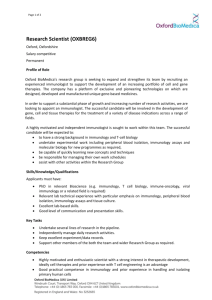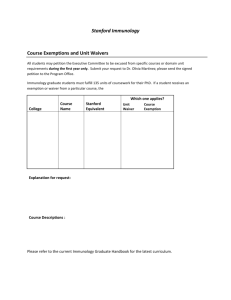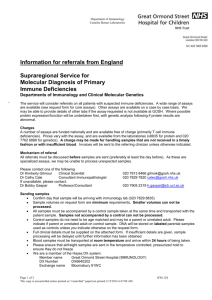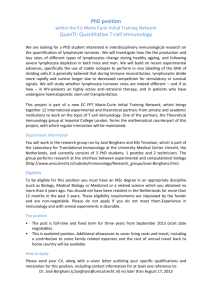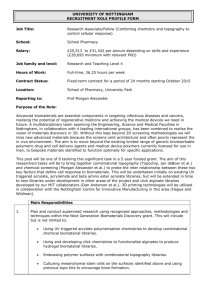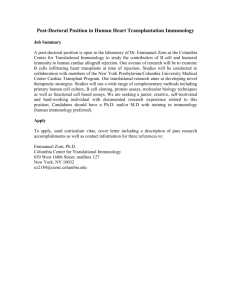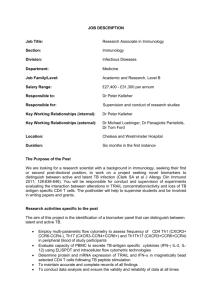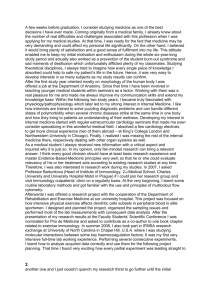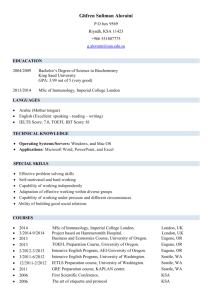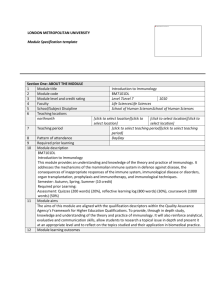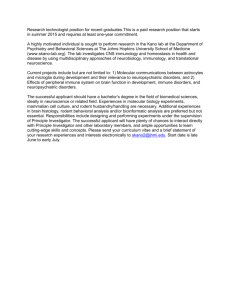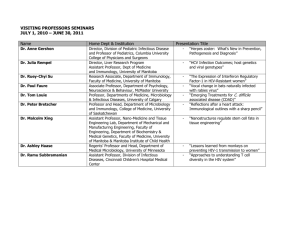Job Title: - Jobs - University of Nottingham
advertisement
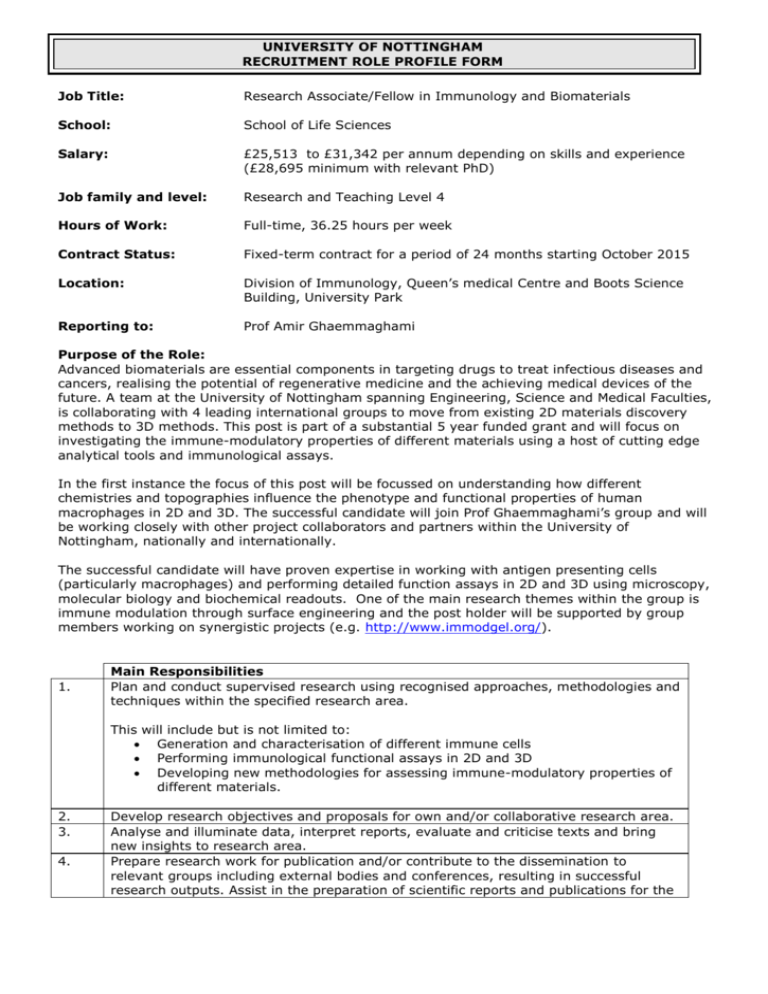
UNIVERSITY OF NOTTINGHAM RECRUITMENT ROLE PROFILE FORM Job Title: Research Associate/Fellow in Immunology and Biomaterials School: School of Life Sciences Salary: £25,513 to £31,342 per annum depending on skills and experience (£28,695 minimum with relevant PhD) Job family and level: Research and Teaching Level 4 Hours of Work: Full-time, 36.25 hours per week Contract Status: Fixed-term contract for a period of 24 months starting October 2015 Location: Division of Immunology, Queen’s medical Centre and Boots Science Building, University Park Reporting to: Prof Amir Ghaemmaghami Purpose of the Role: Advanced biomaterials are essential components in targeting drugs to treat infectious diseases and cancers, realising the potential of regenerative medicine and the achieving medical devices of the future. A team at the University of Nottingham spanning Engineering, Science and Medical Faculties, is collaborating with 4 leading international groups to move from existing 2D materials discovery methods to 3D methods. This post is part of a substantial 5 year funded grant and will focus on investigating the immune-modulatory properties of different materials using a host of cutting edge analytical tools and immunological assays. In the first instance the focus of this post will be focussed on understanding how different chemistries and topographies influence the phenotype and functional properties of human macrophages in 2D and 3D. The successful candidate will join Prof Ghaemmaghami’s group and will be working closely with other project collaborators and partners within the University of Nottingham, nationally and internationally. The successful candidate will have proven expertise in working with antigen presenting cells (particularly macrophages) and performing detailed function assays in 2D and 3D using microscopy, molecular biology and biochemical readouts. One of the main research themes within the group is immune modulation through surface engineering and the post holder will be supported by group members working on synergistic projects (e.g. http://www.immodgel.org/). 1. Main Responsibilities Plan and conduct supervised research using recognised approaches, methodologies and techniques within the specified research area. This will include but is not limited to: Generation and characterisation of different immune cells Performing immunological functional assays in 2D and 3D Developing new methodologies for assessing immune-modulatory properties of different materials. 2. 3. 4. Develop research objectives and proposals for own and/or collaborative research area. Analyse and illuminate data, interpret reports, evaluate and criticise texts and bring new insights to research area. Prepare research work for publication and/or contribute to the dissemination to relevant groups including external bodies and conferences, resulting in successful research outputs. Assist in the preparation of scientific reports and publications for the 5. 6. 7. 8. 9. 10. 11. 12. 13. grant. Identify opportunities and assist in writing bids for research grant applications. Prepare proposals and applications to both external and/or internal bodies for funding, contractual or accreditation purposes. Build relationships with both internal and external contacts in order to exchange information, to form relationships for future collaborations and identify potential sources of funds and/or opportunities for collaboration. Co-ordinate the operational aspect of research networks, for example, arranging meetings and updating web sites etc. and contribute to collaborative decision making with colleagues in area of research. Work in conjunction with others in the research team to achieve objectives and make an active contribution to the success of the team. Provide support, guidance and supervision to other staff, where appropriate in own area of expertise. Assist in the supervision of undergraduate and/or postgraduate students projects, fieldwork and placements, as appropriate. To participate in the assessment of student knowledge and co-supervise projects at Masters level. Collaborate with academic colleagues on areas of shared interest for example, course development, collaborative or joint research projects. Plan and manage own research activity and resolve problems, if required, in meeting own/team research objectives and deadlines in collaboration with others. Contribute to the organisation of research resources and facilities, laboratories and workshops as appropriate. Undertake general laboratory duties such as ordering of reagents, equipment maintenance, and laboratory housekeeping. Contribute to teaching, for example through laboratory demonstrations, lectures to postgraduate workshops and/or delivery of Level 1 modules. Person Specification: Qualifications/ Education Skills/Training Essential 1. A 1st or upper-second class honours degree in cell biology/immunology and a PhD (or equivalent) thesis submitted/nearing completion or awarded in cell biology/immunology or related areas 2. Proven expertise in working with antigen presenting cells and relevant skills in their characterisation using microscopy, molecular/biochemical readouts and flow cytometry. 3. A strong commitment to interdisciplinary research, in particular between immunology, biomedical surfaces and material sciences. 4. Excellent oral and written communication skills including the ability to communicate complex information with clarity and write to a publishable standard. 5. Strong analytical skills including the ability to analyse and illuminate data, interprets reports, evaluate and criticise texts and bring new insights. Desirable PhD (or equivalent) in cellular of molecular immunology Working with human macrophages and their functional characterisation Expertise in quantifying foreign body response and developing relevant experimental models Expertise in working with multi-cell cultures Working with platelets Experience with biomaterials Expertise in using high throughput screening assays 6. Ability to creatively apply relevant research approaches/models/ techniques/methods and devise and manage research programmes. 7. Excellent problem solving, IT and organisational skills including the effective deployment of resources. 8. Ability to build effective relationships as part of a team and collaborate with others, both internally and externally. 9. Flexible, proactive and dedicated approach. 10. Ability to travel within the UK and overseas. Experience 11. Presenting work effectively to a variety of professional and academic audiences at meetings and conferences. 12. A consistent track record of published research in peer-reviewed journals and writing high quality reports and papers for publication. Statutory/legal First author publications in high impact factor journals. Previous success in gaining support for externally funded research projects. Experience of developing new approaches, models, techniques or methods in cellular immunology and studies involving macrophage/foreign body response. Experience of working on multi-disciplinary projects Training and/or supervision of staff or students. Flexible approach to new Methods in research N/A Due to the requirements of the UK Border and Immigration Agency, applicants who are not UK or EEA nationals and whose immigration status entitles them to work without restriction in the UK will be considered on an equal basis with UK and EEA nationals. Other non-UK or non-EEA nationals whose employment will require permission to work subject to a resident labour market test may only be considered if there are no suitable UK or EEA national candidates for the post. Please visit http://www.ukba.homeoffice.gov.uk/ for more information. Informal enquiries may be addressed to Prof Amir Ghaemmaghami (amg@notingham.ac.uk), tel 0115 82 30730). Please note that applications sent directly to these email addresses will not be accepted. Equality and Diversity The University of Nottingham has a range of policies to promote equality and diversity in the workplace which are fully supported and promoted by the School through its Equality and Diversity Committee. The School welcomes applications from all candidates and you can read more about our commitment to equality and diversity at http://tiny.cc/UoNPharmEandD Please quote ref: NEXTGEN-230515.
